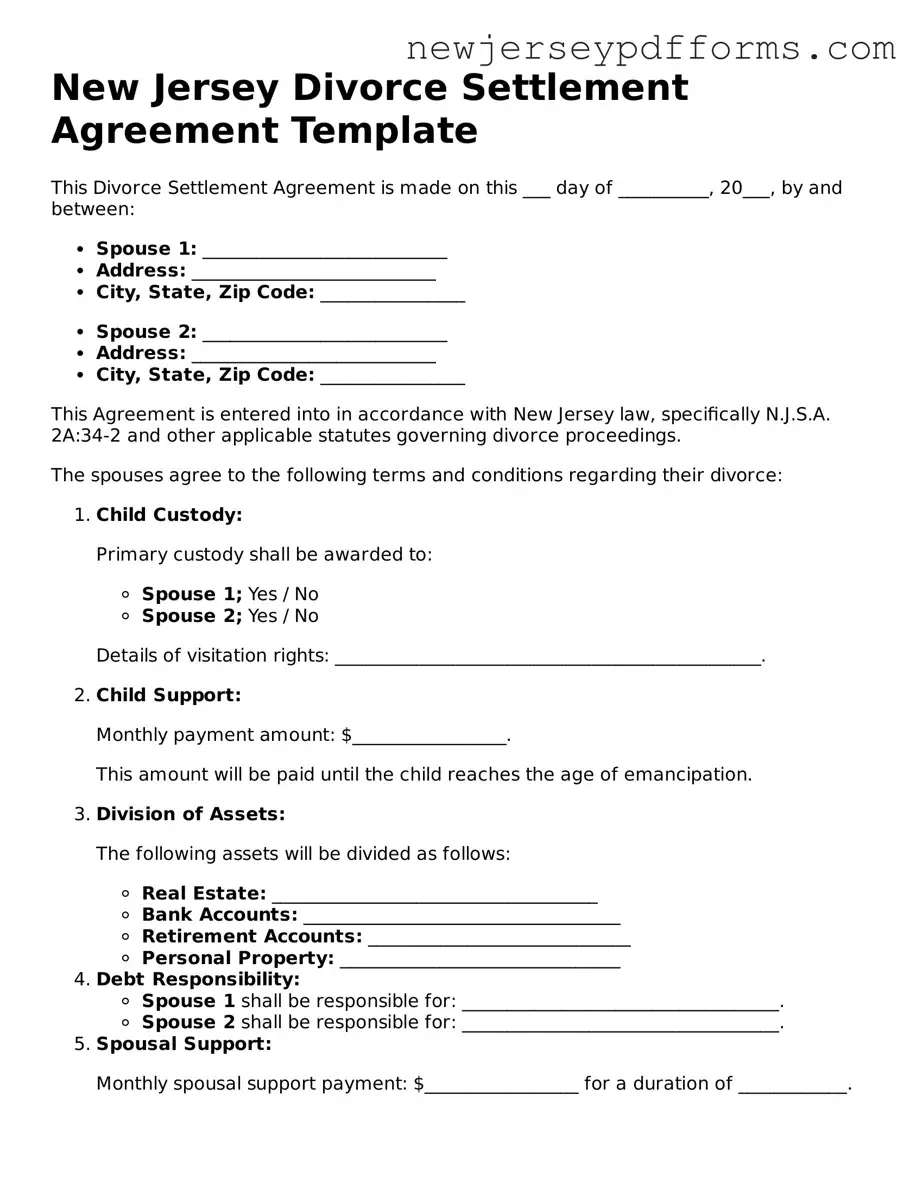What is a Divorce Settlement Agreement in New Jersey?
A Divorce Settlement Agreement is a legally binding document that outlines the terms of a divorce between two parties. It typically includes provisions regarding the division of assets, child custody, child support, and alimony. This agreement is essential for ensuring that both parties have a clear understanding of their rights and responsibilities following the divorce.
How do I create a Divorce Settlement Agreement?
To create a Divorce Settlement Agreement, both parties should discuss and negotiate the terms they want to include. It is often beneficial to consult with a lawyer to ensure that the agreement is fair and compliant with New Jersey law. Once the terms are agreed upon, the document should be drafted and signed by both parties. It may also need to be submitted to the court for approval.
Can I modify the Divorce Settlement Agreement after it is signed?
Yes, a Divorce Settlement Agreement can be modified after it has been signed, but only under certain circumstances. If both parties agree to the changes, they can draft a new agreement or an amendment to the original. If one party wants to make changes without the other's consent, they may need to go to court to seek a modification, especially if it involves child support or custody arrangements.
What happens if one party does not comply with the agreement?
If one party fails to comply with the terms of the Divorce Settlement Agreement, the other party can seek enforcement through the court. This may involve filing a motion for enforcement, which can lead to various remedies, including court-ordered compliance, modification of the agreement, or even penalties for the non-compliant party.
Is a Divorce Settlement Agreement the same as a divorce decree?
No, a Divorce Settlement Agreement and a divorce decree are not the same. The Divorce Settlement Agreement is the negotiated document that outlines the terms of the divorce, while the divorce decree is the official court order that finalizes the divorce and incorporates the terms of the settlement. The decree is what makes the agreement enforceable by law.
Do I need a lawyer to draft a Divorce Settlement Agreement?
While it is not legally required to have a lawyer draft a Divorce Settlement Agreement, it is highly advisable. A lawyer can help ensure that the agreement is fair, comprehensive, and compliant with New Jersey laws. They can also provide valuable advice on potential pitfalls and help protect your rights throughout the process.
What should be included in a Divorce Settlement Agreement?
A comprehensive Divorce Settlement Agreement should include several key components. These often encompass the division of marital assets and debts, child custody arrangements, visitation schedules, child support obligations, alimony terms, and any other relevant issues. Clarity and detail are essential to avoid future disputes.
How long does it take to finalize a Divorce Settlement Agreement?
The time it takes to finalize a Divorce Settlement Agreement can vary significantly based on the complexity of the issues involved and the willingness of both parties to negotiate. In some cases, agreements can be reached in a matter of weeks, while more complicated situations may take several months. Once an agreement is reached, it must be submitted to the court, which may take additional time for approval.
What if my spouse and I cannot agree on the terms?
If you and your spouse cannot agree on the terms of the Divorce Settlement Agreement, you may need to consider mediation or collaborative divorce options. These methods can facilitate communication and negotiation in a less adversarial environment. If these approaches fail, the case may go to court, where a judge will make the final decisions on contested issues.

